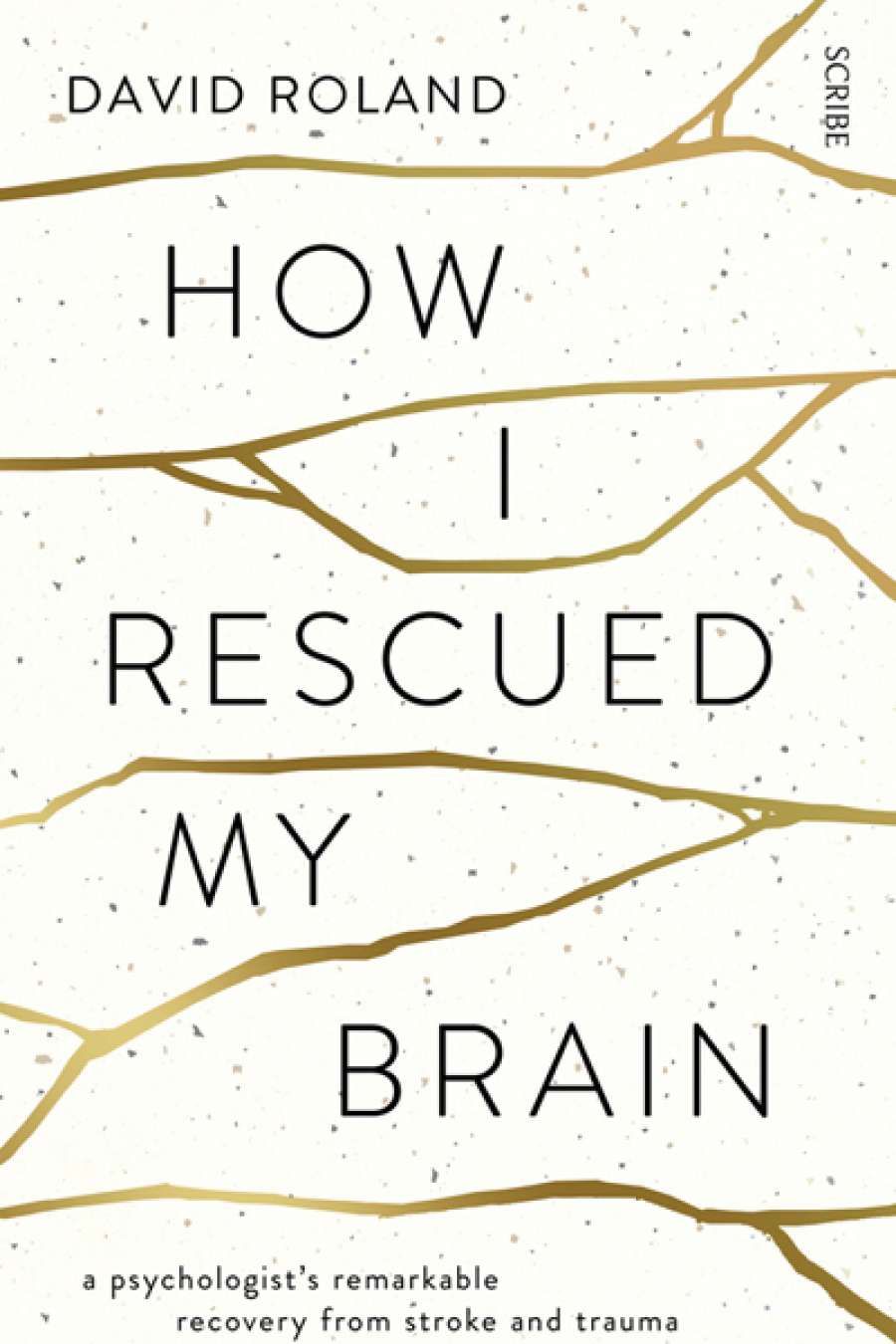
- Free Article: No
- Contents Category: Memoir
- Custom Article Title: Nick Haslam reviews 'How I Rescued My Brain' by David Roland
- Review Article: Yes
- Article Title: Brain saviour
- Online Only: No
- Custom Highlight Text:
The brain, notes philosopher Paul Churchland, is the engine of reason and the seat of the soul. David Roland’s memoir of stroke and its aftermath presents a vivid picture of engine failure and a soul unseated. His book lays bare the disorienting realities of brain injury and his gradual but faltering steps towards recovery. In time he adjusts to having a somewhat less powerful cognitive engine and achieves a more well-upholstered sense of self.
- Book 1 Title: How I Rescued My Brain
- Book 1 Biblio: Scribe, $29.99 pb, 290 pp
Then comes the stroke. Immediately afterward, there is confusion and the feeling of living in a bubble of unreality. He is taken to a clinic where his condition is originally misdiagnosed as a breakdown. Only later does an MRI confirm damage to parts of his brain that subserve memory, hearing, and vision. Roland is at his best when he describes its impacts – crushing fatigue, headaches, difficulty processing speech, inability to recall names – and his attempts to conceal or adjust to them. His exploration of the subjective feel of cognitive impairment is illuminating, particularly his three levels of incapacity: murky ‘fog brain’, ‘rubber brain’ that can’t assimilate new information, and the aching pressure of ‘sore brain’.
In the process of coming to terms with his impairment, Roland consults an assortment of professionals. There are psychiatrists, psychologists, neurologists, neuropsychologists, speech pathologists, ophthalmologists, and that endangered species, the psychotherapist who interprets dreams. His experience as a patient, on the receiving end of the professional services that he had previously delivered, is a revelation to him. Roland feels the turning of the tables keenly, encountering ineptitude, disinterest, and occasional contempt, one technician responding to him as if he were ‘a piece of talking dung’. Meanwhile, he tries to leap the doctor–patient divide by mentioning his professional training to his clinicians, and is mortified when he comes across former patients with whom he now shares a damaged and diminished status.
Roland’s appraisal of his professional treatment is balanced, but he finds that it offers only partial solutions. Directing his own recovery, he finds value in meditation retreats, Tibetan Buddhism, mindfulness, writing, Pilates, fish oil, and brain-training software. He reads up on popular and academic neuroscience and takes a shine to the hopeful idea of neuroplasticity, made famous by Norman Doidge’s The Brain That Changes Itself (2007). Increasingly, he comes to understand his condition in neural terms, a matter of brain regions, networks, and connections. There are no happy endings or ultimate cures. Roland’s marriage moves towards separation, his financial and legal woes persist, and he abandons the idea of returning to clinical practice as he accommodates himself to being disabled. He nevertheless finds a sense of peace, mission, and self-acceptance as his cognitive function gradually returns.
 David Roland (photograph courtesy of Scribe)
David Roland (photograph courtesy of Scribe)
In addressing a neurological condition, Roland’s illness memoir is unusual. There are many first-person accounts of mental illness and physical disease, but few in the intermediate territory of brain injury. Most popular neurology tells third-person tales of strange symptoms, such as men who mistake spouses for headgear. How I Rescued My Brain is valuable in presenting the inside view of neurological impairment and demonstrating the liminal nature of brain injury, at the border of psychology and medicine, mind, and body. It is difficult in Roland’s case to extricate the clinical effects of his pre-existing trauma and depression from those caused by his stroke, and the relation between them remains ambiguous throughout. How his condition is perceived hinges on the same uncertainty: psychological problem or neurological illness? When Roland first receives confirmation that he has had a stroke, he is overjoyed: ‘If I’ve had a stroke, and that’s physical … I haven’t had a mental breakdown. Relief floods through me. Fucking fantastic.’ His wife confesses that she had been angrily convinced that his problems were due to his self-absorption, but became more sympathetic when the stroke diagnosis meant they could be ascribed to bad biological luck.
How I Rescued My Brain is most engaging when it stays close to Roland’s experience. He is an acute observer with an appealing voice. The book is less compelling when it ventures into popular neuroscience. There are clear expositions of brain anatomy and function, but they are incidental to the main story of recovery. It is often unclear whether the translation from psychology into neurology brings explanatory gain rather than false concreteness. When Roland writes that ‘my prefrontal cortex and my limbic system wrestle with each other’, have we travelled beyond Plato’s battling reason and emotion or Freud’s ego and id? Roland’s expressed goal during recovery is to activate his left prefrontal cortex, but his methods for doing so do not target the brain directly and are the same ones a neurosceptic might recommend. Neuroscientific explanation continues to risk reducing rather than clarifying human experience and identity. Did Roland rescue his brain, or did his brain rescue itself?


Comments powered by CComment